Go Lean Commentary
There is that Biblical directive:
Live by the Sword; Die by the Sword – Matthew 26:52
While the reference is here to the weapon of a sword, the truism of this statement applies to any weapon.
So for our American counterparts, this version is apropos: “Live by the Gun; Die by the Gun”.
Consider the recent school shootings and mass shootings, is there any doubt to the fulfillment of these words: America and guns go hand in hand.

Here’s proof! See this news article here; here this town in Georgia tried to mandate that every home own a gun. This is real! See the article & VIDEO here:
Title: Georgia City Loses Battle Over Mandatory Gun Ownership Law, Affirms Right Not To Bear Arms
By: Nick Wing
The small city of Nelson, [Georgia], agreed Thursday to revise an ordinance passed earlier this year that required every household to own a gun.
The measure, passed in April, drew nationwide attention for attempting to make gun and ammunition ownership mandatory. The Brady Center to Prevent Gun Violence, a national gun control group, sued Nelson over the law, claiming it was unconstitutional to make those demands of its citizens.
Nelson settled the suit this week when the city council unanimously approved a motion to amend the ordinance, the Atlanta Journal-Constitution reported. Here are the additions to the text:
WHEREAS, many members of the City Council believe that possessing a firearm in the home is an effective means to defend residents and the community; and
WHEREAS, the City Council also recognizes that there are other means available to defend families and homes, and the Constitution protects the rights of Americans to choose not to possess a firearm or bring one into the home….
The Brady Center applauded the city council’s decision in a statement:
“The Constitution protects not just the right to bear arms, but the right not to bear arms,” said Jonathan Lowy, Director of the Legal Action Project at the Brady Center. “The Brady Center brought this lawsuit to establish that the Constitution protects the rights of gun owners and non-gun owners alike, and all of us must be respectful of each other’s rights. We are pleased that as a result of our lawsuit the City of Nelson has recognized that the Second Amendment protects the rights of the hundreds of millions of Americans who believe that the best way to keep themselves and their families safe is by keeping guns out of their homes.”
While the idea of mandatory gun ownership is clearly a divisive one, many people on both sides of the issue pointed out that Nelson’s push was never likely to have been enforced. As the Associated Press reported in April, the ordinance had exemptions for convicted felons, those who suffer from certain physical or mental disabilities, and anyone who generally objects to gun ownership.
Lamar Kellett, a Brady Center member and one of Nelson’s 1,317 residents, was concerned that the law could lead to his being punished for opting not to own a firearm, so he sued. On Thursday, he called Nelson’s changes an “acceptable solution.”
Other mandatory gun ownership laws, meanwhile, remain in place largely without controversy. Kennesaw, Ga. has had such a measure on the books since 1982, though the law is rarely enforced, and some residents reportedly opt to ignore it.
Source: Huffington Post; Posted August 23, 2013; retrieved June 22, 2018: https://www.huffingtonpost.com/2013/08/23/nelson-georgia-guns_n_3805292.html
—————
VIDEO – Guns for everybody: Georgia town makes firearm ownership mandatory – https://youtu.be/e6DELdrYZuI
RT America
Published on Apr 2, 2013 – The city council in the town of Nelson, Georgia voted unanimously in favor of every resident possessing a gun at their homes. Now it’s compulsory for all of them, and Nelson isn’t the only US town to vote for a measure like this. RT’s Liz Wahl explains.Find RT America in your area: http://rt.com/where-to-watch/
Or watch us online: http://rt.com/on-air/rt-america-air/
- Category: News & Politics
- License: Standard YouTube License
Say it Ain’t So! Is this the life that Caribbean people want? It should not be!
Yet, we are losing so many of our people to this eventuality. Our people leave due to “Push and Pull” reasons. “Push” refers to the societal defects in the Caribbean that moves people to want to get way; and “pull” factors refer to the impressions and perceptions that America is better. Surely a mandatory gun culture is not better!
The purpose of this commentary is to relate two strong points of contention:
- We need to dissuade the high emigration rates of Caribbean citizens to the American homeland.
- We need to encourage the Caribbean Diaspora to repatriate back to their ancestral homeland.
According to the foregoing article, American life is to “live by the sword/gun and die by the sword/gun”. Despite all the efforts to change this disposition, America’s consistency with guns continue, even now to the point that some communities want to mandate that every household have a gun. This is not the case in the Caribbean.
Yippee! If only, we can “prosper where planted” there. Yes, we can!
This commentary and the movement behind the book Go Lean … Caribbean asserts that “yes, we can” reform and transform our Caribbean homeland so as to be better places to live, work and play. Where as, Caribbean communities can be elevated and improved, we already comply with common sense gun control, there is no hope for this in America – guns are in their DNA. (Good luck to American Youth demanding change).
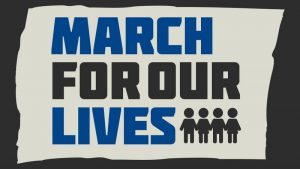
For all Caribbean people in America who want a more sound life – gun wise – we entreat you: It is Time to Go.
This commentary is a continuation of a series from the Go Lean movement, in consideration of reasons why the Diaspora should repatriate back to the Caribbean homeland. There was an original 6-part series in 2016, with these submissions:
- Time to Go: Spot-on for Protest
- Time to Go: No Respect for our Hair
- Time to Go: Logic of Senior Immigration
- Time to Go: Marginalizing Our Vote
- Time to Go: American Vices; Don’t Follow
- Time to Go: Public Schools for Black-and-Brown
Now, we consider 5 new entries along that same theme; they are identified as follows:
- Time to Go: Windrush – 70th Anniversary
- Time to Go: Mandatory Guns – Say it Ain’t So
- Time to Go: Racist History of Loitering
- Time to Go: Blacks Get Longer Sentences From ‘Republican’ Judges
- Time to Go: States must have Population Increases
All of these commentaries relate to the disposition of the Caribbean Diaspora in foreign countries. The Go Lean book and movement serves as a roadmap for the introduction of the technocratic Caribbean Union Trade Federation (CU). The CU is set to optimize Caribbean society through economic, security and governing optimizations. Therefore the Go Lean roadmap has 3 prime directives:
- Optimization of the economic engines in order to grow the regional economy to $800 Billion & create 2.2 million new jobs.
- Establishment of a security apparatus to ensure public safety – including regional gun violence abatements – and protect the economic engines.
- Improve Caribbean governance to support these engines, including a separation-of-powers between the member-states and CU federal agencies.
The “push and pull” factors do imperil Caribbean life. We push our citizens out. Then the resultant effect is a brain drain and even more endangerment to our society: less skilled workers, less entrepreneurs, less law-abiding citizens, less capable public servants – we lose our best and leave the communities with the rest. This create a crisis. The Go Lean roadmap posits that the entire Caribbean is now in crisis; so many of our citizens have fled for refuge in the US and other foreign countries, but the refuge is a mirage. The “grass is not necessarily greener on the other side”. Life in the US, is definitely not optimized – can you imagine living in a community where everyone is mandated to have a gun.
Yes, there is a challenge to reform and transform communities in the US; and there is a challenge to reform and transform communities in the Caribbean. It is easier though, to fix the Caribbean than to fix the American eco-system. So it is Time to Go, so our Caribbean people can do the work to prosper where planted in their Caribbean communities.
Why not simply try to fix America?
The history and DNA of America may be beyond our reach.
Just consider:
Who benefits from a mandatory gun ownership policy?
The Retail Stores and gun manufacturers!
This is Crony-Capitalism at work – exploiting the public good for private profit.
Also underlying the Second Amendment (of the US Constitution) is the white supremacy defect. This ignominious Second Amendment; is a product of the previous Slave Culture, as one original motivation in 1791 was to suppress insurrection, allegedly including slave revolts [60][61][62]. A previous blog-commentary entitled 10 Things We Want from the US and 10 Things We Don’t Want from the US detailed this rationale:
The “right to bear arms” has a personal application beyond the country’s entitlement to maintain a militia. This “right” has been interpreted in a manner in which any normal “man” can get possession of guns and other armament. This proliferation of guns in society results in the highest rate of gun violence in the world, even an unconscionable rate of school shootings.
The Go Lean roadmap purports that this status has also caused discord – a gross abuse and availability of illegal guns – in bordering communities of Mexico, and Caribbean states of the Bahamas, and the DR. This propels our gun-related crime.
The US still has some societal defects – racism and Crony-Capitalism for example – that are so imbrued that they are tied to the country’s DNA. This is why the Go Lean movement posits that it is easier to effect change at home in the Caribbean, than in the foreign country of the US.
In a previous blog-commentary, a thesis was presented that for Caribbean citizens, it is NOT better to live “fast & furious” in the US, but rather it is better to prosper where planted in the Caribbean homeland. Life in the US may experience a shorter mortality due to the riskier reality, like this dangerous gun culture – this is not just theory, a Caribbean Diaspora’s daughter was killed in the Parkland School Shooting in February 2018. And yet, our Caribbean communities are losing people more and more to the US with our atrocious societal abandonment rates.
While we are declaring that it is “Time to Go“, we are also preparing for the return – fixing our economic, security and governing defects. Our goal is to be an American protégé and not a parasite; maybe to even be Better Than America.
If this is going to be, it starts with me – being residential in the Caribbean homeland. Time to Go!
The vision of the CU is a confederation of the 30 member-states of the Caribbean to do the heavy-lifting of championing better economic and security policies. There is the structure of a separation-of-powers between CU agencies and the individual member-states. So the CU will be able to do more independently than the regional status quo, while also helping to elevate the status quo security deliveries in the 30 member-states.
The Go Lean roadmap provides turn-by-turn directions on how to reform the Caribbean security apparatus to better secure Caribbean society as a whole. This roadmap concedes that the Caribbean is in crisis, but that this “crisis would be a terrible thing to waste”. As a planning tool, the roadmap commences with a Declaration of Interdependence, pronouncing the approach of regional integration (Page 12 – 13) as a viable solution to elevate the region’s societal engines:
x. Whereas we are surrounded and allied to nations of larger proportions in land mass, populations, and treasuries, elements in their societies may have ill-intent in their pursuits, at the expense of the safety and security of our citizens. We must therefore appoint “new guards” to ensure our public safety and threats against our society, both domestic and foreign. The Federation must employ the latest advances and best practices … to assuage continuous threats against public safety.
xi. Whereas all men are entitled to the benefits of good governance in a free society, “new guards” must be enacted to dissuade the emergence of incompetence, corruption, nepotism and cronyism at the peril of the people’s best interest. The Federation must guarantee the executions of a social contract between government and the governed.
xvi. Whereas security of our homeland is inextricably linked to prosperity of the homeland, the economic and security interest of the region needs to be aligned under the same governance. Since economic crimes, including piracy and other forms of terrorism, can imperil the functioning of the wheels of commerce for all the citizenry, the accedence of this Federation must equip the security apparatus with the tools and techniques for predictive and proactive interdictions.
xix. Whereas our legacy in recent times is one of societal abandonment, it is imperative that incentives and encouragement be put in place to first dissuade the human flight, and then entice and welcome the return of our Diaspora back to our shores …
Change has now come. The driver of this change is globalization. Caribbean people have been emigrating in their search for a better life. Nelson, Georgia – from the foregoing article – should not be that destination. Nor should any community that refuses to implement common sense gun control. The bottom-line should not include sacrificing our children. The bottom-line motive should be the Greater Good – “the greatest good for the greatest number of people which is the measure of right and wrong – not profit, prejudice nor emigration.
The Go Lean book provides 370-pages of turn-by-turn instructions on “how” to adopt new community ethos, plus the strategies, tactics, implementations and advocacies to execute so as to transform the societal engines of Caribbean society, regarding guns and gun control. In addition, the Go Lean movement have presented many previous blog-commentaries on regional security and common-sense provisions to remediate and mitigate crime and violence. See this sample here:
| https://goleancaribbean.com/blog/?p=14596 | Forging Change – Corporate Vigilantism To Help with Guns |
| https://goleancaribbean.com/blog/?p=14556 | Observing the Change … with Guns |
| https://goleancaribbean.com/blog/?p=13746 | Failure to Launch – Security: Caribbean Basin Security Dreams |
| https://goleancaribbean.com/blog/?p=13476 | Future Focused – Policing the Police |
| https://goleancaribbean.com/blog/?p=13213 | Caribbean People ‘Pulled’ – Despite American Guns |
| https://goleancaribbean.com/blog/?p=13126 | “Must Love Dogs” – Providing K9 Solutions for Better Security |
| https://goleancaribbean.com/blog/?p=12400 | Accede the Caribbean Arrest Treaty |
| https://goleancaribbean.com/blog/?p=11332 | Boston Bombing Anniversary – Learning Lessons |
| https://goleancaribbean.com/blog/?p=11244 | Live Fast; Die Young – The Fast & Furious Life in the US |
| https://goleancaribbean.com/blog/?p=11048 | Managing the ‘Strong versus the Weak’ Series – Mitigating Bullies |
| https://goleancaribbean.com/blog/?p=9072 | Model: Shots-Fired Monitoring – Securing the Homeland on the Ground |
| https://goleancaribbean.com/blog/?p=7485 | Mitigating Interpersonal Violence Series – Street Crimes |
In the Caribbean, we need to dissuade our people from leaving … and incentivize many of the Diaspora to return. We need our people to help us reform and transform our societies. Fleeing to America is not the answer! The grass is not greener on the other side. There are far too many guns in America for that society to be inviting. No, America is not the panacea for all of the Caribbean ills. To the contrary, we must reform and transform our own society.
The Go Lean/CU roadmap asserts that now is the time for all of the Caribbean – residents and Diaspora – to lean-in for the empowerments described here in the book Go Lean … Caribbean. This is conceivable, believable and achievable that we can elevate our homeland and to make our communities better places to live, work and play.
Now is the Time to Go … home! 🙂
Download the book Go Lean … Caribbean – now!
Sign the petition to lean-in for this roadmap for the Caribbean Union Trade Federation.

 Absolutely! Yes, we can!
Absolutely! Yes, we can!
 If this sounds fantastical, just know that there are successful role model countries doing this e-Government 3.0 right now. For example, the Baltic Republic country of Estonia is widely recognized as
If this sounds fantastical, just know that there are successful role model countries doing this e-Government 3.0 right now. For example, the Baltic Republic country of Estonia is widely recognized as  e-Government helps simplify processes and makes government information more easily accessible for public sector agencies and citizens. For example, the
e-Government helps simplify processes and makes government information more easily accessible for public sector agencies and citizens. For example, the 









 Were you alive in the 1960’s or 1970’s?
Were you alive in the 1960’s or 1970’s? If this is the truth for the “greatest of the greats”, how much more so for the “lesser of the Less Than‘s”?
If this is the truth for the “greatest of the greats”, how much more so for the “lesser of the Less Than‘s”?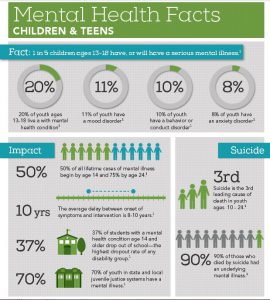

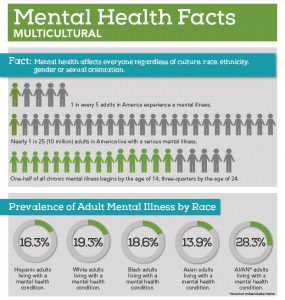
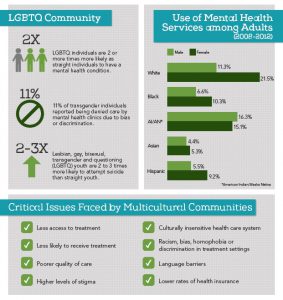
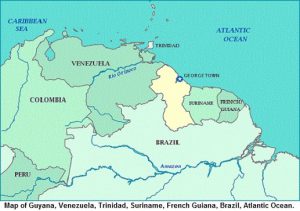
 If you are a father yourself, you have probably said it. It’s a rite of passage. When it comes to Money Matters, satisfying housing is a Big Deal in starting any discussion. This was the case for the motivation for the book Go Lean…Caribbean – a roadmap for the technocratic Caribbean Union Trade Federation (CU) – in considering how to reboot Caribbean economics to deviate from the current failing disposition and move the region to a path of success. Page 152 of the book stated:
If you are a father yourself, you have probably said it. It’s a rite of passage. When it comes to Money Matters, satisfying housing is a Big Deal in starting any discussion. This was the case for the motivation for the book Go Lean…Caribbean – a roadmap for the technocratic Caribbean Union Trade Federation (CU) – in considering how to reboot Caribbean economics to deviate from the current failing disposition and move the region to a path of success. Page 152 of the book stated: Now multiply that by 42 million people. Welcome to the quest to reform and transform the Caribbean societal engines. Considering the 3 societal engines of a community – economics, security and governance – it is so much easier to lead and get people to comply – to lean-in – if there are empowerments for housing.
Now multiply that by 42 million people. Welcome to the quest to reform and transform the Caribbean societal engines. Considering the 3 societal engines of a community – economics, security and governance – it is so much easier to lead and get people to comply – to lean-in – if there are empowerments for housing.

 The Foreign Office warned to avoid crowded places after cops discovered a suspected plot to target the Mardi Gras festivities on Monday and Tuesday.
The Foreign Office warned to avoid crowded places after cops discovered a suspected plot to target the Mardi Gras festivities on Monday and Tuesday.


 Imagine a Caribbean reality with flat-rate envelopes and flat-rate boxes. Imagine the automation, the robotic technologies, the scanning and sorting. The brand CPU would really be apropos – more software, e-Commerce and Internet Communications Technology – as opposed to the neighborhood mail-carrier. See this industrial shift in the related news article in the Appendix below. In fact, the company
Imagine a Caribbean reality with flat-rate envelopes and flat-rate boxes. Imagine the automation, the robotic technologies, the scanning and sorting. The brand CPU would really be apropos – more software, e-Commerce and Internet Communications Technology – as opposed to the neighborhood mail-carrier. See this industrial shift in the related news article in the Appendix below. In fact, the company 
 Of the 30 member-states that constitute the Caribbean region, Cuba does not align with any of these previously identified structures, but still the book Go Lean … Caribbean declares that they are not alone. There is the offer of collaboration, confederacy and comradery with the rest of the neighborhood in the Caribbean region. The book declares (Page 5) … to Cuba and the rest of the region (based on the 1972 song “Lean On Me” by Bill Withers):
Of the 30 member-states that constitute the Caribbean region, Cuba does not align with any of these previously identified structures, but still the book Go Lean … Caribbean declares that they are not alone. There is the offer of collaboration, confederacy and comradery with the rest of the neighborhood in the Caribbean region. The book declares (Page 5) … to Cuba and the rest of the region (based on the 1972 song “Lean On Me” by Bill Withers):
 “Deputize me!” – these are the words of the CU Trade Federation to the Caribbean member-states governments. Deputizing an external agency is pretty standard in our modern day. In addition, there are many treaties that create an organizational structure to administer the tenants of a multilateral agreement. Let’s consider one example that has a lot of relevance within the Caribbean region, the International Atomic Energy Agency (IAEA). While the impression of nuclear-atomic energy may not be Caribbean tropical, there are in fact 4 member-states that have ratified the IAEA treaty (Cuba, Haiti, Jamaica and the Dominican Republic; plus 2 more pending: St Lucia & Grenada).
“Deputize me!” – these are the words of the CU Trade Federation to the Caribbean member-states governments. Deputizing an external agency is pretty standard in our modern day. In addition, there are many treaties that create an organizational structure to administer the tenants of a multilateral agreement. Let’s consider one example that has a lot of relevance within the Caribbean region, the International Atomic Energy Agency (IAEA). While the impression of nuclear-atomic energy may not be Caribbean tropical, there are in fact 4 member-states that have ratified the IAEA treaty (Cuba, Haiti, Jamaica and the Dominican Republic; plus 2 more pending: St Lucia & Grenada).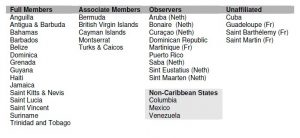 There is also a proposed new regime for the 30 member-states that constitute the Caribbean; 15 of these member are Full Members of the Caribbean Community (CariCom). While 5 states are Associate Members and 9 are Observers. The CariCom construct is therefore the best starting point for any regional integration.
There is also a proposed new regime for the 30 member-states that constitute the Caribbean; 15 of these member are Full Members of the Caribbean Community (CariCom). While 5 states are Associate Members and 9 are Observers. The CariCom construct is therefore the best starting point for any regional integration.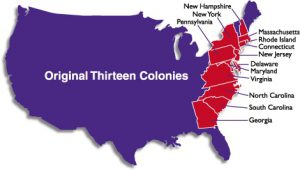 After the Declaration of Independence in 1776 and until the enactment of the Constitution in 1789, there was a temporary period of 13 years under the Articles of Confederacy. During that structure, each state (former colony) was afforded 1 vote in Congress. So the BIG state of Virginia yielded the same political power as the small state of Delaware. This was a defect! The correction came with the adoption of the Connecticut Compromise into the Constitution; this called for the adoption of a bicameral legislature (2 chambers): Upper House & Lower House. See the full details in the Appendix Reference below.
After the Declaration of Independence in 1776 and until the enactment of the Constitution in 1789, there was a temporary period of 13 years under the Articles of Confederacy. During that structure, each state (former colony) was afforded 1 vote in Congress. So the BIG state of Virginia yielded the same political power as the small state of Delaware. This was a defect! The correction came with the adoption of the Connecticut Compromise into the Constitution; this called for the adoption of a bicameral legislature (2 chambers): Upper House & Lower House. See the full details in the Appendix Reference below.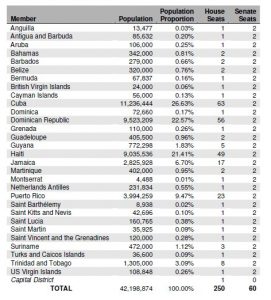
 The current regional construct –
The current regional construct –